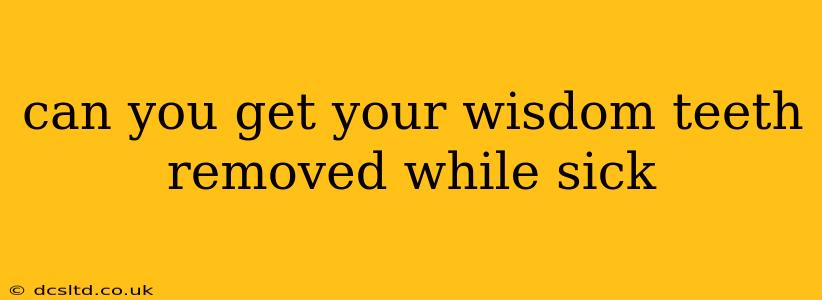Can You Get Your Wisdom Teeth Removed While Sick?
Getting your wisdom teeth removed is a significant oral surgery procedure, and your overall health plays a crucial role in its success and your post-operative recovery. The simple answer is: no, you generally shouldn't get your wisdom teeth removed while sick. Your oral surgeon will likely postpone the procedure if you're unwell. Let's delve into the reasons why.
What illnesses might postpone wisdom teeth removal?
Several illnesses can significantly impact your ability to undergo wisdom teeth extraction safely and effectively. These include:
-
Infections: Active infections, whether respiratory (like the common cold, flu, or bronchitis), skin infections, or urinary tract infections, increase the risk of complications during and after surgery. The infection could spread, leading to more serious problems. Your immune system is already fighting the infection, so it won't be able to focus on healing the extraction sites as efficiently.
-
Fever: A fever indicates your body is fighting an illness. This elevates your body temperature, which can interfere with healing and increase the risk of infection.
-
Compromised Immune System: Conditions like HIV or autoimmune diseases weaken your immune system, making you more susceptible to complications after surgery. This increased risk necessitates postponing the procedure until your immune system is stronger.
-
Severe Allergies: Allergies that could trigger a severe reaction (anaphylaxis) during surgery are a serious concern. The anesthesia and medication used during the procedure could trigger an allergic reaction, making the surgery unsafe.
-
Uncontrolled Chronic Conditions: Conditions like diabetes, heart disease, or high blood pressure need to be well-managed before surgery. Uncontrolled conditions greatly increase the risks associated with anesthesia and the surgical procedure itself.
How long should I wait after being sick before getting wisdom teeth removed?
The waiting period varies depending on the severity and type of illness. Generally, you should wait until you are completely symptom-free for at least 7-10 days, and sometimes longer, before scheduling your wisdom teeth removal. This allows your body to fully recover and reduce the risk of complications. Your oral surgeon will ultimately make this determination based on your specific situation.
What should I do if I’m sick and have wisdom teeth removal scheduled?
If you're feeling unwell close to your scheduled wisdom teeth removal, contact your oral surgeon immediately. Don't simply show up for the procedure. They'll assess your condition and decide whether to reschedule. Postponing the surgery is always better than risking complications. Rescheduling is generally straightforward and won't affect your overall health negatively.
What are the risks of having wisdom teeth removed while sick?
The risks of undergoing wisdom teeth extraction while sick are significant and can include:
- Increased risk of infection: The surgical site is more prone to infection when your immune system is already compromised.
- Slower healing: Your body needs all its resources to fight illness; it won't heal efficiently after surgery.
- Increased pain and discomfort: Recovery may be more painful and prolonged.
- Post-operative complications: Serious complications like dry socket (alveolar osteitis) are more likely.
What questions should I ask my oral surgeon before wisdom teeth removal?
Before your procedure, discuss any health concerns or recent illnesses with your oral surgeon. Ask about:
- The best course of action if you become ill before surgery.
- What specific symptoms require rescheduling.
- The potential risks of undergoing the procedure while unwell.
By prioritizing your health and communicating openly with your oral surgeon, you can ensure a safe and successful wisdom teeth removal procedure. Remember, delaying surgery is a far better choice than risking serious complications.
